|
|
| |
■
『世界の英語教室 (小学校)』[フィンランド編]
 New!
New!
| Hello from Finland! (フィンランドからこんにちは!)
By Mina Hisada/Illustration by Puri & Harumi Kakeru |
|
フィンランドといえば、皆さんは何を思い浮かべるだろう。サンタクロース? ムーミン? 森と湖? 先端技術?(←確かに! 世界的に有名な通信機器メーカー NOKIA はフィンランドから生まれているのだから)だが、最近では「教育」を思い浮かべる人も多いのではないだろうか。この国では高度なIT技術や特色ある外国語教育など、グローバル社会で生きていく上で欠かせない分野で高い評価を受け、その質の高さから、世界中の関係者の注目を集めているのだ。今回は、現地の小学校に通うニコラス君(9歳)を通して、フィンランドの、主に外国語教育を中心に、現状を探ってみたい。
(What's the first thing that leaps to mind when you think of Finland? Santa Claus? Moomin? Forests and lakes? IT technology (NOKIA is from Finland!) ? Some people might also associate Finland with education. Advanced IT technology and foreign-language learning are two indispensable elements of living in a globalized society. Finland provides both of these at a high level that has attracted much attention from foreign media. So, let's explore Finnish language education by talking to 9-year-old Niklas who lives in Finland.)
|
|
 第5回目の今回は、
第5回目の今回は、
フィンランドの小学生にスポットライトを
当てます。
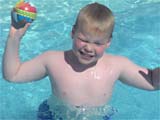
| |
"Hello from Finland. My name is Niklas"
|
|
|
|
<フィンランドひとくちメモ>
☆フィンランドは、実は日本から一番近いヨーロッパの国だ。首都ヘルシンキまで直行便で9時間半。
国土の70%が森林で、森と湖の国として知られている。よくフィンランド人が自分たちを「suomi(スオミ)」と呼ぶが、これはまさしくフィンランド語で「湖や沼のある大地」を意味する。人口は約500万人。公用語はスウェーデン語とフィンランド語だが、これはかつてスウェーデンの植民地だった名残とみられる。普段耳にするのはフィンランド語だ。
(Finland is the closest European country to Japan. It takes about nine-and-a-half hours to get there by direct flight to Helsinki. Seventy percent of the land is forested and the country is famous as being 'the country of forests and lakes. The Finnish call themselves 'SUOMI', which means "the people of the land of lakes and swamps" in Finnish. The population of Finland is about 5 million. Their official languages are Swedish and Finnish. This is because Finland was once colonized by Sweden. However, the language you hear most in Finland is Finnish.)
|
■PART 1
今日のお友達:フィンランドのニコラス君(9 歳)
(Today, we have here Niklas , who is 9 years old.)
| TIME |
WHAT I DO |
|
8:00-9:00 |
体育(Sports)
|
|
9:00-10:00 |
フィンランド語(Finnish)
|
|
10:00-11:00 |
美術
(Arts)
|
|
11:00 -12:00 |
宗教(Religion)
|
|
12:00-13:00
|
算数(Math)
|
|
13:00-14:00
|
英語(English)
|
※注釈
(Note) |
★クラスの人数は25人。
でも、算数と英語 の時間は二つのクラスに分けられるよ。
(The number of students in each class is 25. )
(But it's divided into two smaller classes for mathematics and English. )
★木曜日はちょっと特別な日。なぜかというと…
(Thursdays are a little bit special. Because …)
⇒午前中で学校は終わるから!
(School finishes in the morning.)
★勉強が遅れ気味でも補講クラスがあるから大丈夫! 先生が分かるまで面倒を見てくれる。
先生がこれでOK! と判断したら、
元のクラスに戻れる。ちなに、フィンランドに塾はないんだよ。
(My teacher always takes good care of us. If we can't keep up, there are extra classes after school. We have to take these extra classes until the teacher says we don't have to take them any more. There is no cram schools in our country.)
★授業時間は日本の小学校と同じ45分。授業の合間には15分間の休憩があるよ。
(Classes are 45 minutes long in Finland, like in Japan. There are 15-minute breaks between each class.)
|
|
|
■PART 3
フィンランドの子供たちはどうやって英語を勉強しているの?
(How do Finnish kids master English?)
これは小学校の教科書です。
(Here are some textbooks used by elementary school students, courtesy of Tommi, Takako, and Jukka-sensei.
Thank you for your cooperation, Uemura-san and Tokiko-san!)

(フィンランドの小学生用英語の
教科書のカバー)
|
|
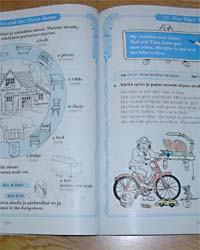
(教科書の中身その1)
|
|

(教科書の中身その2)
|
|
フィンランド英語の特徴
(The characteristics of Finnish English)
| |
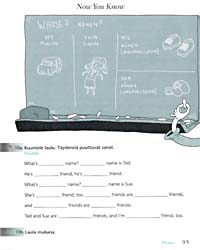 (教科書の中身その3)
(教科書の中身その3)
 (教科書の中身その4)
(教科書の中身その4)
■(図書館で)「うさぎのことを調べたいのだけれど…」
「じゃあ、パソコンを使ったら?」(動物について実際に自分で調べてみよう、という内容です)
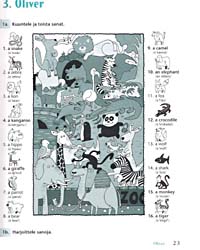 (教科書の中身その5)
(教科書の中身その5)
■発音練習

(教科書の中身その6 )
|
●
特徴 (Characteristics )
☆★特徴1(Characteristic 1)☆★
☆英語の単語をローマ字読みしてしまうことがある
(They tend to read English, like Japanese read romaji.)
例)IMAGEを「イマゲ」
For example, they would pronounce "image" as "i-ma-ge"
Example) IMAGE → image
※フィンランド語もアルファベットを使って書き表しますが、ローマ字読みのように書いてあるまま読むため起こると考えられます。
(Finnish uses the Roman alphabet, but is read like the Japanese read romaji.)
☆★特徴2(Characteristic 2)☆★
☆ アクセントが平坦になってしまう
(Flat intonation)
※ フィンランド語はいつでも単語の最初の母音にアクセントを付けるため。
(In Finnish, the accent always comes at the beginning.)
☆★特徴3(Characteristic 3)☆★
☆ 彼?彼女?(He? Or She? )
※フィンランド語では、He もSheも同じ言葉で表される
(注)ため、英語を話すときにHe
とSheを混同してしまうことがある。例えば、ボーイフレンドの話なのに、"She"で話してしまっていることも…!
(In Finnish, there is no difference between he and she(※). Sometimes, it can be a bit confusing, particularly if you're talking about boyfriends and girlfriends.)
(注)その言葉は"Haen"といいます。
(※ He or she is referred to as 'Haen" in Finnish.)
☆★特徴4(Characteristic 4)☆★
☆冠詞を抜かしてしまいがち
(They tend not to use articles.)
※フィンランドには冠詞がないため
(Because there are no articles in Finnish)
☆★特徴5(Characteristic 5)☆★
☆ thの発音が苦手( Weak point is 'th')
※thの音が元々フィンランド語にはないため、tの発音になってしまう。
(There is no "th" sound in Finnish, so they end up pronouncing it "t".)
例)threeを tree
Example) three → tree
|
|
■PART 4
フィンランドの公立の小学校についての基本データ
(General information on public elementary schools in Finland)
★クラスの人数
(How many students are there in a class?) |
25人
(About25.) |
★英語は何歳からはじめるの?
(When do you start learning English?) |
9歳からスタート。
だが強制ではなく、英語のほかに、ドイツ語、フランス語、ロシア語、スウェーデン語の中から外国語を選ぶことが出来る。
98%の児童は英語を選ぶ。
(At the age of nine. Students can choose one language from among English, German, French, Russian, and Swedish. Ninety-eight percent of them choose English.)
|
★政府は小学校での英語教育を奨励している?
(Is English education from an early age encouraged by the government?) |
している。(Yes.)
英語だけでなく、「外国語教育」全般を奨励している。
(Yes. They encourage not only English, but "foreign languages" in general.)
|
★小学校での英語の授業は週に何時間あるの?
(On average, how many hours each week does elementary school students study English?)
|
グレード3&7(9歳から13歳) 2時間
(Two hours from grade 3 & 7)
グレ−ド 8&9(14歳から15歳):3時間
(Two hours from grade 8 & 9)
|
★フィンランドでは、みんな英語教育に興味はあるの?
(Are most people interested in English education in Finland?) |
はい。
(Yes. )
|
★英語の塾はあるの?
(Are there many English cram schools in Finland?) |
ない。
(No there aren't.)
|
★英語の先生はネイティブ?
(Are the English teachers native speakers?) |
いいえ。先生はフィンランド人。
(No, they are Finnish.)
|
★外国人の生徒はいるの?
(Are there foreign students? If so, where are they from?) |
いる。特にほかのEU諸国、ロシア、中国から。
(Yes. Especially from other countries in EU, Russia and China.)
|
★日本の小学校でも英語が必須科目になるかもしれないの。どう思う?
(English may become a compulsory subject at elementary schools in Japan. What do you think about that?) |
いいと思う。
英語はメジャーな言語だから、早くから子供が接する必要があると思う。
(It's a good thing, because English is a major language. It's necessary to learn it from an early age.)
|
★識字率を教えて!
(What is Finnish's literacy rate?) |
100%
(It's 100%)
|
|
|
■PART 5
人々の声
Vox populi
 フィンランド人が見た小学生の英語教育
フィンランド人が見た小学生の英語教育
★
このサイトに登場してくれたお友達ニコラス君のお母さんのマリッタさんは、小学校で英語とフランス語を教えています。彼女から見たフィンランドの英語教育は?
(Niklas's mum, Marrita, teaches English and French at an elementary school. Let's hear her opinions on English teaching.)
|
 |
<英語は押し付けではなく選択制・クラスの人数は半分に>
English should not be a compulsory subject; class sizes should be kept to a minimum
どの言語にもそれぞれのイントネーションやリズムがあり、それを習得するにはそれ相応の時間がかかるものです。フィンランドの子供たちはグレ−ド3(9歳)で第一外国語(英語だけでなく、英・フランス・ドイツ・ロシア・スウェーデン語の中から選べる)と接しますが、その際にまず発音を習います。特に口頭表現に重点が置かれ、クラスではたくさん話すよう訓練されます。子供たちがなるべく参加できるよう、英語の時間は25人のクラスを半分にしています。これは、子供たちに発言の機会が多く与えられ、授業に参加しやすくなるというだけでなく、教師自身は子供たちの間違いや欠点に気が付き、目が行き届くようになるからです。
(It is evident that all languages have their own intonation and rhythm and it takes some time to learn them. As children in Finland start to study their first foreign language in the 3rd grade (at the age of 9), they learn to pronounce rather well. Furthermore, the emphasis of teaching is on oral expression, so they practice a lot of speaking in classroom. The group size is relatively small, usually a class that has about 25 pupils is divided into two groups for the English lessons. So, everybody gets a chance to speak and express themselves and the teacher has time to pay attention to possible mistakes or shortcomings. )
<文法の違い>
The difference of grammar
英語とフィンランド語は、文法が全く違います。フィンランド語には冠詞がなく、英語を学び始めた子供たちにとってはこれがネックになるようです。特に、定冠詞(the)に関しては、とても難しいようです。実際に息子のニコラスが書いた文章をご紹介しましょう。
(※冠詞が入っていないことにご注目を!)
(In terms of grammar, English and Finnish are totally different. Finnish has no article, and it's one of the difficult points for Finnish children to learn English. Especially 'the' seems very hard for them. Let's introduce a sentence which my son, Niklas, has written.
(Note: There is no article!)
There is monkey in zoo.
<発音について>
About the pronunciation
英語はフィンランド語に比べてやわらかく聞こえます。フィンランドの子音はドイツ語ほどかたく聞こえませんが、日本語よりは少しかたく聞こえるかもしれません。ということは、フィンランド英語もかたく聞こえるということになるかと思います。子供たちのなかには、"Sue" "shoe"、"zoo" をすべて同じSという発音ですませてしまう子供もいます。フィンランド語のSには二つの発音しかないので、最初の"Sue" と "shoe"をきちんと発音できたとしても、三つ目の"zoo"をきちんと発音できなかったりします。
(English sounds softer than Finnish. Finnish consonants are quite hard; not as hard as in German but maybe a little bit harder than in Japanese. That makes "Finnish English" sound hard, too. Sometimes different s-sounds cause problems as well like in the words Sue, shoe, zoo ? quite many children would pronounce them with a similar s-sound, and even if some could manage to pronounce two different s, the third one would definitely be a problem, as we have only two different s-sounds in Finnish.)
<生の英語に触れています>
Exposure to real English
初めに触れましたが、フィンランドでは第一外国語は9歳から学びます。子供たちはたいてい英語を選び、それ以降の5年間は1週間に2時間、14歳からは2年間、週に3時間ほど学びます。テレビやラジオ、映画やパソコン、ゲームなどは英語を学ぶ上でとても重要な媒体となります。ほとんどのゲームは英語であり、またフィンランドでは吹き替えをしないため、テレビや衛星中継などで、しょっちゅう生の英語を耳にしています。
(As I mentioned above, the first foreign language starts in the 3rd grade. Children usually study English 2 hours/week for the first 5 years, and then 3 hours/week for 2 years. TV, radio, movies and these days computers and computer games are a great support for learning English as most games are in English and the programs on the Finnish TV as well as movies are broadcasted in their original language - people hear English almost constantly.)
|
 日本在住のフィンランド人から見た日本の小学生英語教育とは?
日本在住のフィンランド人から見た日本の小学生英語教育とは?
★Anneさんは、日本人のご主人と日本で暮らすフィンランド人です。
(Anne lives in Japan with her Japanese husband.)
|

|
<放課後の過ごし方-フィンランド編>
After school in Finland
フィンランドでは、大半の親たちは子供たちが1時間以内で宿題を終えるべきだといい、残りの時間は学校の授業とは関係のない趣味を楽しんだり、友達と遊ぶことに使うことを勧めています。これは(一見関係のないようにみえますが)、結局学校で学んだ理論を実践するということにつながっていくのです。
(In Finland, many parents share the opinion that children should be able to finish their homework in about an hour, leaving the rest of the day for playing with other children or spending time for hobbies and interests not related to their schooling. This, according to their beliefs, gives the children broader perspectives, gives them time to digest what they have learnt at school, or perhaps even gives them a chance to put the theories they learned at school into practice. )
<放課後の過ごし方- 日本編>
After school in Japan
日本では塾という、また学校とは別の「学校」に通う子どもが多いですよね。
(塾については、「世界の英語教室(小学校)」[日本編]のPart 5「人々の声」、冠君のお母さんのコメントを参照してください。)
(For your reference,click here . Read Kan's mum comment on 'Juku' , at Part 5.)
「塾」は受験の準備をするところだといわれています。学校についていえば、日本の親たちも子供たちも口を開けば「頑張る」とか「一生懸命」といいます。この言葉の背景には、子供たちがまだ幼いにもかかわらず、学校生活でのプレッシャーやその責任感と戦っていることがうかがえます。
(In Japan, however, the school children spend a big part of their after school hours in voluntary schooling, attending different prep schools, i.e., "juku", that are said to preparing them for entrance examinations for the next level of schooling. When talking about school, both the Japanese parents and school children keep using the word "gambaru" or "issyokenmei" and there is a sense of responsibility or pressure to their school life, even though these school children are still very young children. )
<日本の新聞や地下鉄で目につく「あの広告」>
The ads in the subway and newspapers
英語教育に関しても、上で述べたようなことがいえると思います。フィンランドでは、子供たちは学校でしか英語を勉強しません。子供をターゲットにした語学学校はもちろんのこと、大人をターゲットにした語学学校もありません。しかし日本では、新聞を広げれば必ず英語の語学学校(英会話スクール)の広告が目に付き、それは地下鉄に乗ってもやはり同じことです。このことだけをみると、まるですべての日本人が英語を上手に話すのではないか? と思ってしまうほどです。
(When it comes to English education, the above-mentioned point still holds true. In Finland, school children study English only at school. English language schools targeted at young kids are virtually nonexistent, nor are there many schools for the older generation, either. In Japan, you can not read a newspaper or get on the subway without your eyes catching ads for English language schools. The number of different English schools is so great that you might think it would result in all Japanese becoming good English speakers.)
<教師の質の良さ>
The quality of teachers
なぜフィンランド人は英語を上手に話す人が多いのでしょうか。まず第一の理由として、教師の質の良さを挙げることができると思います。小学校の教師は大卒であり、かつ修士課程と同等の学位を持っていることが条件となっています。厳しい競争を勝ち抜いて大学に入学した彼らは、エリートであると同時に、英語という言語を研究し始める大学生のころにはすでに流ちょうな英語を身に付けているのです。
(How do the Finns then learn to become good English speakers? The first reason, I would have to say, is the quality of teachers: In order to be qualified for an English teacher in elementary school in Finland, one needs a higher university degree, equivalent to MA. Because of severe competition for the university entrance, only the best students are chosen to enter universities. Therefore, when enrolled in university and starting English language studies, the students already speak fluent English, many of whom speak even with flawless pronunciation.)
<学習時間の長さについて>
No. of hours spent on English
第二に、英語の学習時間の長さがあげられると思います(フィンランドでは日本の学校よりもその時間数は長い)。外国語学習において「何度も繰り返して学ぶ」ということは、普段その言葉を使わない学習者にとって、ことのほか大切なことだと思います。
(Secondly, I believe we offer more hours of English per week to our children than the Japanese schools do. Repetition is a key in any learning, but it becomes especially important with language learning as schoolchildren generally do not have natural encounters with language in their everyday life. In the case of biology, however, when children learn about plants, they can see plants in the nature and probably find some resemblance to what they have just learnt in the classroom.)
<字幕スーパーの大切さ>
The value of subtitles
より重要なこととして、フィンランドでは昔から英語圏の番組をフィンランド語に吹き替えることなく、字幕スーパーで流すということがあげられるでしょう。このような方法で、どの子供でも家庭で生の英語を聞くことができるのです。生の英語を繰り返し聞いていれば、よりよい発音が身に付くようになると思います。
(More importantly, I believe a lot of credit goes to Finnish television broadcasting. In Finland, we customarily use subtitles instead of dubbing when broadcasting English language programs. In that way, English language enters the living rooms of almost every school girl and school boy every day. When you repeatedly hear spoken English, it will help you to learn better pronunciation and to hear the differences of close-but-different sounds. )
<日本人はもっと自信を持つべきです>
Japanese should be more confident in their English
日本に住み始めて7年がたち分かったことは、日本人はかなりの英語力を持っているということです。ただ、英語を使う「自信」や「コミュニケーション能力」に欠けているということだけだと思います。この大きな原因の一つに、「発音」が挙げられるのではないかと思います。ただ、英語をうまく話すようになるのに何もネイティブのような発音を身に付けている必要はないと思います。ひとつ気を付けてもらいたいのは、カタカナ英語のまま発音してしまわないこと。
英語からきている外来語やカタカナの発音をそのまま言ってしまうと(例えば、club を「クラブ」、あるいはtextを「テキスト」など)、相手が日本語を知っている人でない限り、なかなか通じにくいでしょう。カタカナ英語は日本人が英語を話す際に、大きなネックになっている原因の一つだと思います。コミュニケーションをとることは、その言語を学んでいこうとするより大きなモチベーションになるため、もしそこでつまずいてしまったら、せっかくのやる気がうせてしまうというものです。
(After living in Japan for seven years, I have come to realize that many Japanese actually have a good knowledge of the English language, but they just lack the confidence or ability to communicate in English. I believe a lot of it has to do with the lack of knowledge of proper English pronunciation. I do not think that it is necessary to have a pronunciation close to that of a native speaker in order to become a good speaker of English. But at the same time if you try to communicate with a foreigner, saying ku-ra-bu instead of "club" or te-ki-su-to instead of "maintext", you are doomed to fail, unless the person you are talking to happens to understand Japanese. I think "katakana English" is one of the biggest obstacles for Japanese people to communicate in English face-to-face. Communication is the very thing that gives you the meaning and motivation to study further. If you stumble on that, you will find it very difficult to come up with a good reason to continue studying further.)
|
|
 Piaさんは愛知万博のため日本に来日中。彼女の語る英語教育とは?
Piaさんは愛知万博のため日本に来日中。彼女の語る英語教育とは?
(Pia is in Japan for Aich Expo. What's her English education?)
|

|
<世界でもトップクラスの教育システム>
A internationally top-class educational system
最近フィンランドの教育が日本でとても注目を浴びていますが、その理由はフィンランドの教育システムが世界でもトップクラスにあるからだということは、言うまでもないでしょう。特に語学教育に関しては、日本の教育システムにおいてもいくつか参考になる点があると思います。
(Education in Finland has gained a lot of attention in Japan lately, and no wonder since it is considered to be the best in the world. Especially in the field of language education, there is much the Japanese schooling system could learn. )
<外国語を使わせる幼稚園も>
Kindergartens using foreign languages
フィンランドでは外国語教育を早くから始めます。90年代前半に私が小学校に通っていたころは、グレード3(9歳)で、ほとんどの子供たちが最初の外国語を学んでいました。最近では、外国語を毎日使わせる幼稚園に通う子供たちも増えています。
(Study of foreign languages starts early in Finland. When I attended elementary school in the early '90s, most of the children began their first foreign-language classes at the age of nine when they were in the third grade. Nowadays, it is getting more and more common for the children to attend a kindergarten where only a foreign language is used. )
<話す訓練をしてみよう>
Practice makes perfect
日本の語学のクラスと比べてみて(といっても 東京の中学校をいくつか見ただけですが)、口頭練習がフィンランドでは重点的に行われていると思います。まず最初に習うことはあいさつと自己紹介です。文法やボキャボラリーは勉強を進めていくうちに自然に身に付いてくるものです。
(In comparison to Japanese language classes - I have only seen a few in a junior high school in Tokyo - in Finland, speaking skills are emphasized. The first thing one learns is to greet and introduce oneself. The grammar and vocabulary naturally come into the picture as one progresses with one's studies.)
<「ディスカッション」できる力を>
The ability to actively participate in discussions
フィンランドの語学教育から日本が参考にできること、それは「外国語を学習するときには、もっと口頭練習に力を入れる」ということだと思います。個人的に、多くの日本人は文法に強いと思います。けれど、その外国語を使ってディスカッションしたりする能力には欠けていると思うのです。
(Putting more emphasis on the development of speaking skills in foreign languages is something I think the Japanese schooling system could learn from the Finnish one. In my opinion, very many Japanese are skillful and competent, for example, in the grammar of English but lack the capability to discuss things in that language. )
|
 フィンランド通の日本人から見た小学生の英語教育とは?
フィンランド通の日本人から見た小学生の英語教育とは?
★ヘルシンキ留学経験のある、フィンランド通の服部さん。彼が見たフィンランドの英語事情とは?
(Mr.Hattori has once studied in Helsinki. He is familiar with Finnish society. What is his opinion?)
|

|
<フィンランドの外国語教育について>
On Finland's foreign language education system
フィンランドはヨーロッパのほかのほとんどの国々と全く異なる起源を持つ国です。例えば、フィンランド語と隣のスウェーデンで話されているスウェーデン語や、ロシアで話されているロシア語とには、日本語と英語くらいの違いがあります。しかも、地球上でフィンランド語を話す人はフィンランドに住んでいる500万人程の人たちだけなので、世界の中でもフィンランド語はマイナーな言語です。フィンランドの子供たちは日本と同じく、小学校の6年間と中学校の3年間義務教育を受けますが、小学3年生から英語の授業が始まり、中学に入ってからは第2の公用語であるスウェーデン語を勉強するようになります。さらに高校に入るとまた別の外国語の授業を選択できるなど、フィンランド政府は外国語教育にとても力を注いでいます。テレビ番組や娯楽もほかのヨーロッパの国やアメリカから入ってくるものが多いので、フィンランドの子供たちは普段から外国語に接する機会が非常に多いです。特にテレビ番組や映画は、イギリスやアメリカのものが人気で、フィンランド語の字幕を読みながら、英語の音声を聞いて、生の発音や言い回しを自然に覚えるそうです。
(The origin of Finnish is a lot different from other European languages. For example, Finland's neighbor, Sweden and Russia, have languages that are very different to Finnish, as different, say, as Japanese and English. Besides, its population is only about 5 million people. Hence, the language itself is of minor importance on the world scene. In Finland, the children start going to schools around the same age as Japanese children, and they have a compulsory six years at elementary school and three years at junior high school. English is taught from grade 3, and Swedish - which is the second official language of Finland - at junior high school. They can also choose another foreign language at high school. As you can see, Finland's government is making a great effort in foreign language education. Lots of TV channels and other entertainment come from other European countries or the United States. Finnish children are used to hear foreign languages through television and film, which are always subtitled and never dubbed.)
<日本が学べることとは?>
What can we learn from Finland?
まず日本に比べて少人数のクラスで授業を行なうため、授業の密度が濃いです。またヒアリング能力習得のため、英語の授業でもいわゆる米語や英語だけでなく、スコットランド人やジャマイカ人、中国人といった人々が話す現地英語を理解するトレーニングなども行なわれているようです。なお比較的若い年齢から外国語を学び始めるので、外国語学習に対して抵抗感が少ないのではないでしょうか。
(Because of their small size, classes are more intense and effective. They also learn not only American and British English, but also other foreign accents, such as Scottish, Jamaican or Chinese English. The children also have less difficulty learning foreign languages because of their early age.)
<日本の小学校で「英語」が必須科目になるかもしれないことについて>
English may become a compulsory subject at elementary schools in Japan. What do you think about that?
基本的には賛成です。しかし、小学生のころから英語を学習することの目的が国際人の育成、ということならばほかの外国語も早期から学習できる環境を整えるべきだと思います。小学生のころから英語を学び始めることが、小学校高学年時、あるいは中学入学後から始まる第2外国語の教育の布石になればいいのではないでしょうか。日本では「英語=外国語」のような考えが主流ですが、英語もあくまでも数ある外国語の一つでしかないのですから。
(Basically, I think it's a good idea. However, if its aim is to nurture an internationally minded person, then I think children should have the chance to learn other languages from an early age too. This could be a stepping stone to learning a second foreign language at junior high school. You see, when the Japanese thinking of learning a foreign language, they tend only to think of learning English, but we have to be aware that English is just one of many languages in the world.)
|
 フィンランド通の日本人から見た小学生の英語教育とは?
フィンランド通の日本人から見た小学生の英語教育とは?
★スイス在住の由江さんには、フィンランド人のご主人と息子さんがいます。
(Yoshie has been living in Switzerland with her Finnish husband and son. What is her opinion?)
|

|
<放課後の「自由参加英語クラス」はどうでしょう?>
What do you think of optional extra-curricular English classes for students who want to learn English?
現在日本では、小学校で英語を必須科目にするかどうかを真剣に考えているようですが、言葉はたくさん聞いて、たくさん使って習得するものだと思うので、義務とか、強制のもとに、教えられる科目が増えるというだけでは抵抗があります。宿題が増えるのも子供たちにとって楽しくない話です。一方で、帰国子女は年々増え、幼児英語教育も普及しつつあります。でしたら放課後、主に、小学校の中高学年を対象に自由参加できる科目外英語授業を行なうというのはどうかなと思います。これなら誰にも公平です。もちろん1年生でも希望者は参加でき、宿題も強制も義務もなく、楽しく、できるだけ自然に習得できるとしたら、決して悪いことではないと思います。まずはそんなところからスタートしてはどうでしょうか。
(I heard that Japan is seriously considering whether English should become a compulsory subject at elementary school or not. Personally, I think the best way of learning a foreign language is through listening to it and using it as much as you can, and children might be averse to English if it's a compulsory subject with lots of homework. On the other hand, the number of children returning from abroad is growing and there are more opportunities to learn English at an early age. So what about offering optional extracurricular English classes to children? They could be held after school, and open to everybody, of all grades. There is no homework, no sense of compulsion ? only fun and curiosity and they could study it in a more natural environment. It doesn't sound bad.)
<フィンランドと英語教育>
Finland and English education
フィンランド人の夫によると、以前は日本でいう中学1年生から英語の授業があり、その内容は文法中心で、翻訳をたくさん練習させられたのだそうです。その後、彼が中学生だった時代の中学では、読解やヒアリングが中心で、そのほかに話す練習や書く練習、それにボキャブラリーを増やすことに重点を置き、かつて力を入れていた文法の比重は四分の一以下に減ったのだそうです。文法が完ぺきでなくても会話はできるし、子供にとって文法から入るのは難しいとの判断からのようです。
(My husband told me there was a time that English was taught from junior high school in Finland. In those days, classes focused on grammar and translation. Now, it's changed its focus to reading, listening, as well as writing. Grammar content was reduced to about a quarter of what it used to be. The reason for this is that you can have a conversation without perfect knowledge of grammar, and also it might be difficult for children to learn gramMarch)
<なぜ外国語教育が盛んなのか>
Why a foreign language education is on focused in Finland?
フィンランドのように、人口500万人の小国にとって、外国語の習得は不可欠だと言っても過言ではないのです。以前フィンランドでは、第二公用語であるスウェーデン語が小学校四年生で必須科目となっていましたが、現在英語と立場が逆転したようです。とはいっても、同じ英語を学ぶ出発点は日本人と異なるように思います。フィンランド語と英語では、単語や読み方、変化の仕方が違うとはいえ、フィンランド語には英語にあるアルファベットがすべてあります。アルファベットの発音を聞き慣れている、書き慣れているとなれば、それだけで習得に要する時間はグンと短縮されるはず。言い換えれば、日本人が文字も文の構造も、発音も違う言葉を、聞き慣れず、書き慣れず、使い慣れずして習得することなど不可能なことです。英語と共通の文字を持ち、似通った文の構造を持ち、同様の発音を持つ言語を話す人々よりも、日本人が英語の習得に時間がかかるのは当然だという認識のもとに、できるだけ英語を聞く環境と、使う環境を増やす努力をすべきではないでしょうか。
(The population of Finland is only about 5 million people, so it's absolutely necessary to learn a foreign language there. Before, it was Swedish which people had to learn from grade 4. English has now replaced Swedish. It seems to me that the starting point for learning English in Finland is different to Japan. The grammar of Finnish is different to English grammar, but at least it has the same alphabet. This can save a lot of time. I think the Japanese have to be more aware that it will take them longer to learn English than other countries that use the same alphabet and so make more of an effort to create an environment in which they can be more exposed to the language itself.)
<私の息子について>
About my son
余談になりますが、私のもうすぐ六歳になる一人息子は、第三国に住んでいるという家庭の事情で、幸か不幸か3ヵ国語を学ばなければなりません。私とは日本語で会話し、夫とはフィンランド語で会話をしています。ドイツ語の習得は本人まかせにしました。ドイツ語の聞く環境と使う環境は積極的に設けたつもりです。3ヵ国語ともこれまで順調に伸びていると思います。最近ではスイス・ドイツ語も話すようになりました。この先、彼はアイデンティティや国籍の問題など乗り越えて行かなくてはならない問題と共に、多言語習得への長い道のりを歩き続けなければならないと思います。親として私たちは、一人の人間をよりよく育てるべく努力している今日このごろです。
(My son, who is going to turn to six, must master three different languages. He speaks Japanese with me, and Finnish with my husband. As for German, I didn't force him to study it. Instead, I tried to offer him an environment where he can listen to German and use it. So far, he has been learning three language with no problem. Recently he even began speaking Swiss-German. Born half Japanese, half Finnish, he might have some problems in terms of identity and nationality, and he has a long way to go before he masters all these languages. As his parents, my husband and I are doing our best to help him.)
|
| | | |
|
■PART 6
フィンランドの教育制の教育制度
(Finnish Educatioal System)

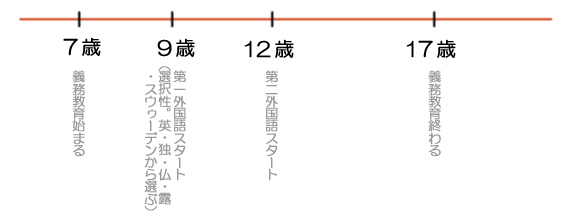
★フィンランドでは、義務教育は7歳から17歳までとなっています。
(At the age of seven, every Finnish person goes to elementary school.
It's required by law that all children go to the school between the age of seven and 17.)
★外国語教育が盛んです。
(Foreign language education is flourishing in Finland.)
★第一外国語(98%が英語を選択)は、グレード3(日本の小学校3年生〔9歳〕)から。
(At the age of nine, they choose their first foreign language.
However, 98% of them choose English.)
★すべての義務教育を終えるころには、3ヵ国語を習得しています。
(By the time they complete their compulsory education, they will have mastered three foreign languages.)
★グレード6(日本でいう中学生)から第二外国語、グレード9(日本でいう高校生)で第三外国語(さらに希望すれば第四外国語も)履修する。
(※ It's because they study a second foreign language at junior high school and another one at a senior high school. They have the option of learning a fourth as well.)
★小学校と中学校は分けておらず、総合学校である。
(No distinction between elementary school and junior high school. )
★総合学校は、フィンランド語でペルスコウル(PERUSKOULU)と呼ばれている。
It's called (SOGOGAKKO in Japanese, and PERUSKOULU in Finnish.)
★「イマージョン教育」を実施している学校もある。例えば、算数や理科を外国語で学ぶ。
("Immersion"-style education is used at some school. For example, mathematics and science are taught in foreign languages.)
(※「イマージョン教育」については「世界の英語教室(小学校)」[番外編]
http://st.japantimes.co.jp/special/lesson/la20050111a1.htm を参照してください)
(For more on the "immersion"-style system, click here!)
|
■PART 7
フィンランドの子どもの1年間
A typical year for a Finnish kid

※日本と違って、フィンランドでは秋学期(8月半ば〜12月)と春学期(1月〜6月)の2学期制です。
| 8月( August) |
9月(September) |
10月(October) |
11月
|
入学シーズン、
秋学期始まる
(Entrance ceremony & beginning of the autumn term)
|
秋の木の実や葉っぱを探しにいくよ。森でベリーつみもします。
Autumn (We go look for nuts and berries in the forest.)

|
秋休み(1週間)
(October -
Autumn vacation for one week.At the end of October,
it's already snowing.)
|
三者面談、父の日
※フィンランドでは、11月に父の日があります。
(November - Parents, teacher, child meeting.
Father's day is in November in Finland.)

|
| 12月(December |
1月(January) |
2月(February) |
3月(March) |
独立記念日、クリスマス休暇(2週間)、秋学期終わる
(National Day & two-week Christmas Vacation)
冬至のころは、日照時間は約3時間だけです。
(The sun is only up for about three hours each day around this time of year.)

|
春学期始まる
(Beginning of spring term)
−20度、30度になることもある。湖でスケートしたり、森でスキーをしたりする
(Sometimes, the temperature falls to -20 or -30. degrees Celsius. We enjoy skating on the lake and skiing in the forest!)
|
スキー休み(1週間)
(Beginning of the skiing vacation for 1 week.)
家族でウィンタースポーツを楽しむ。
(Our family enjoys doing winter sports.)
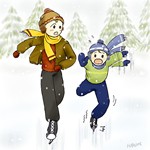
|
オーロラの季節
(The aurora season)

|
| 4月(April) |
5月(May) |
6月(June) |
7月(July) |
イースター休み(4日間)
近所をまわってお菓子集めをする。
(Easter vacation for four days)
|
母の日
May
(Mother's Day)
|
春学期終わり、
夏休みが始まる
(End of the autumn term & beginning of the summer vacation)
|
白夜のため、
夜中も明るい
(Night of the midnight sun)
|
|
☆★編集吐息☆★
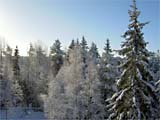 |
| Photo courtesy by Jukka Kallioinen |
*フィンランドにしよう!
(Why 'Finland?)
「小学校の英語教育のことで、今度フィンランドを取り上げようと思うんだけど」―こう尋ねると、あるドイツ人ジャーナリストはこう言った。「それはいいね。だってあそこが一番進んでいるから」。
その英語教育に対する評価の高さは聞いてはいたが、フィンランドと同じEUに加盟する国の人物が言った言葉に真実味を感じた。かくして、フィンランドの英語教育事情について実際に調べてみることになった。
("I'm going to do a feature on Finnish for a column on English education at elementary schools," I said to a German journalist. He said to me 'That's good. It's the most advanced country for that." This comment, which came from someone from the EU, struck a chord in me. And so, I started my research.)
*国のモットー
(The motto of Finland)
「国の財産は木材と人材です」とはっきり言い切るこの国の姿勢は、その教育システムによく表れている。フィンランドの教育システムを調べれば調べるほど、「人を人として最後まで見捨てない、人としての温かさに基づいたシステム」であることが分かる。できない子供にこそ手を差し伸べるその教育制度に、多くの国々が学ぶ必要があり、だからこそ毎年世界各国からこの国の教育を学びに関係者が視察に訪れるのだろう。フィンランドの学校には心のケアをするカウンセラー、体のケアをする保健婦がいたり、また、先生・保護者・生徒によるユニークな三者面談(注)が行なわれている。(注:フィンランドでは、小学校から先生と保護者に生徒を交えた三者面談がある。生徒はこのとき、自分の長所や短所を言い、先生と保護者とこれからどのように勉強をすすめたらよいかを話し合い、
その子供自身の目標を立てる。
(A Finnish politician once said, "Our fortune lies in our trees and our people." Take one look at Finland's education system and you can see that this true. This system has a policy of never abandoning the children. That's the reason why so many teachers from all over the world visit this country every year. Each school is attended by two nurses - one for medical problems, the other for counseling. Schools also hold interviews between a parent, their child and a teacher. (In Japan, the child cannot take part in these interviews.)
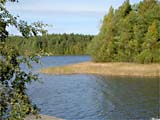 |
| Photo courtesy by Jukka Kallioinen |
*注目される理由
(The reason why it attracts attention)
世界がフィンランドの教育システムに注目することになったきっかけの一つに、2001年に行なわれたPISA調査(OECD〔経済協力開発機構〕による学習到達度調査)が挙げられると思う。この調査では、フィンランドが調査されたいずれの分野においても、トップクラスの成績(読解力1位、数学4位、理科3位)をおさめた。(ちなみに、日本は読解力8位、数学1位、理科2位だった)この要因はいろいろと考えられるが、主なものに「補講クラスが充実しており、塾に頼る必要がなく(そもそも塾というものがない)、学校が最後まで面倒をみてくれること」、「授業が少人数で行なわれること」、「私立がないために学校間の差が少ないこと」、「教師の質が高いこと」、「本と触れる機会が多く、読解力が高いこと(特に父親も教育が協力的)」、「詰め込み式ではなく、自分の頭で考えさせる教育をしていること」などが挙げられるだろう。
(One of the reasons why Finland has received attention recently among educational circles is the result of the PISA survey by OECD. Finland was at the top of most subjects (No.1 for reading, No.4 for mathematics, No.3 for science. Japan was No.8 for reading, No.1 for mathematics, No. 2 for science). The reasons for this are the existence of extra classes to help students keep up — the students don't have to depend on jukus (which, in any case, don't exist in Finland); the schools take good care of students; the small size of classes; the high quality of teachers; and the absence of private schools, which prevent great differences in standards, Having many chances to read books (fathers take an active role here), there is no focus on memorizing. )
また、なんといっても「家庭での教育が徹底していること(日本は塾や学校に頼りがちだ)」が挙げられる。だが、考えてみるに、この理想の教育システムを進めていくにはそれ相応の社会構造の存在が不可欠だ。例えば「教師の質」。教師になってからもさまざまな講習を受けることができるのだ。もちろん費用は国が負担してくれる。また、教師同士で自分達の教え方をチェックしあうシステムもある。これは、風通しのよい教育現場ができるベースとなっている。父親の読み聞かせも然り。フィンランドの会社は朝8時ごろに始まり、午後4時には終わるというところが多い。よって帰宅後は子供たちと近所の森を散策し、家に戻って本の読み聞かせをするという余裕がでてくるのだ。また、子供たちも6月なかばから夏休みに入り、他国の児童に比べて家族と過ごせる時間が多い。それによって家族間のきずなが深まり、家庭教育が充実するという相乗効果を生んでいる。
(I think educational care at home should be emphasized (Parents tend to depend on the schools or juku in Japan). But this kind of educational system requires a certain social background. For example, the reason the quality of teaching is very high in Finland is that they can attend lectures free of charge after becoming teachers. The lectures are subsidized by the government. Also, the reason why fathers read book to their children is that work starts around 8 a.m. and finishes around 4 p.m. It means they have enough time to go to the forest with their children and have time to read books to them. As for the children, the summer vacations start in the middle of June and continue until the end of the August, so they have more time to spend with their parents than other country's children. This creates strong ties within the family, everyone takes care of each other. It's a win-win situation.)
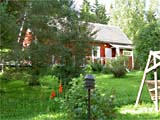 |
| Photo courtesy by Jukka Kallioinen |
*まずは、母国語をしっかりと
(First of all, our mother tongue)
英語教育を小学校から取り入れている国の場合、その大半は7歳からスタートしている。だが、フィンランドは小学校3年(9歳)からと、その中でも遅めだ。これは、早ければ早いほどいいという考えではなく、あくまで母国語であるフィンランド語(スウェーデン語系の学校ではスウェーデン語)をしっかりと身に付けさせてから、という学校の方針に基づいている。
(In countries where English is taught at elementary schools, generally speaking, English education starts from when the child is seven years old. But it's from nine in Finland. This is because there's no "earlier is better" policy. The Finnish believe in mother tongue first, then foreign languages.)
*隣国の言葉を学ぶということ
(Learning other languages)
フィンランドの印象の一つに、「がんじがらめになっていないなぁ」というのがある。例えば小学生の語学教育にしても、ひたすら英語! 英語! と叫ぶ日本と違い、フィンランドでは選択性だ。ドイツ語・フランス語・スウェーデン語の中から選ぶことができる。これには、EUに所属しているということや、地理的・歴史的な理由もあるのだろうが、そうだとしたら日本もその地理的・歴史的な理由から、お隣の韓国や中国、ロシアの言葉を学べる機会が学校で与えられてもおかしくないのではないだろうか。その国の言葉を知るということは、その国の文化や歴史を知るということにもつながる。だから、隣国の言葉は学んでおきたい。フィンランドの外国語教育を通し、こんなことも感じた。
(One of the impressions I received from Finland was that they were held back by not narrow- mindedness. For example, children can choose which foreign language they want to learn at elementary school from among English, German, French and Swedish. However, in Japan, all focus is on English. Perhaps it has something to do with Finland's geography and history, particularly its being part of the EU. So why doesn't Japan offer students opportunities to learn the languages of their neighbors — such as Korean, Chinese or Russian — at school? To study a country's language is to know their culture and history.)
 |
| Photo courtesy by Chris Feller |
*これも理由?
(Is this one of the reasons?)
フィンランド人は、いわゆる金髪・青い目が多いため、外見上では典型的な北欧人のように見える。だが、その歴史をたどってみると東アジアの血が混じっている(ウラル山脈に住んでいたアジア系民族が移動した先が、東ではハンガリー、西ではフィンランドといわれているからだ)。そのため、フィンランド語はほかのヨーロッパ語と違って、インド・ヨーロッパ語族に属さない。同じアルファベットを使っているとはいえ、文法もほかのヨーロッパの言葉とまったく違い、その特徴や構造はむしろ日本語に近い。今回のインタビューで、何人ものフィンランド人が「冠詞を抜かしてしまう」という日本人と共通の、フィンランド人の犯しやすい英語のミスを挙げてくれた。この「別の語族に属する」ということは英語の習得において、それだけハンディが大きいということで、ほかのEU諸国と比べてより時間や労力が必要となる。その上、フィンランド語は国際語ではなく、国際社会を生き抜いていく語学力を身に付けなければならないという事情があったことも、フィンランドで外国語教育が盛んになった理由なのではないだろうか。いや、故意に目指したのではなく、その不利な環境が、かえって国際社会で生きる上で有利な力を蓄える要因になったとも考えられる。まさに、「コンプレックスは武器になる」だ。
(Most Finnish have blue eyes and blond hair. Their appearance is like other Europeans, but apparently they have some Eastern Asian genes too. (They are descended from people who migrated from the Ural Mountains, like the people who eventually settled in Hungary.) This is why Finnish is not one of the Indo-European language. Although Finnish use the Roman alphabet, its grammar is totally different from other European languages. Japanese is more similar to Finnish, in terms of its gramMarch When asked what sort of mistakes the Finnish typically make when speaking English, many people mention articles. The Finnish have trouble putting an article before a word, like the Japanese do. Because the Finnish language is unique, the Finnish have some disadvantages when learning other languages. They are required to spend more time studying foreign languages than other European people. And Finish is not an international language. Ironically, it could be because of these demerits that they have created such an outstanding educational system that allows the Finnish to occupy an important place in the world.)
*小さいからこそ頑張らなきゃ
(We do our best, because we are small!)
とかく、小さな国は大国に比べて外国語教育に熱心だ。その理由は何だろうか。フィンランドの場合、大学での授業が「講義はフィンランド語で、教科書は英語で」ということも珍しくない。これは、国の規模が小さいために書籍の発行数が少なく、必然的に英語で書かれた文献で勉強せざるを得ないという事情があるからだと思われる。1990年代には不況に苦しみ、あえいでいたフィンランド。人口500万の小さな国だからこそ、教育に力を入れ、経済を発展させ、ここまでの成果を挙げてこられたといえるだろう。
(Generally speaking, the smaller the country, the more it tends to focus on teaching foreign languages. What is the reason for this? In the case of Finnish universities, it's not unusual to hear of a class held in Finnish with a text written in English. In 1990, Finland was the country that suffered the most from recession. Because of its small size and population, it made a great effort in improving its educational system, and as a result, its economy improved, and now the country is once again thriving.)
|
|
|
|
|
|
